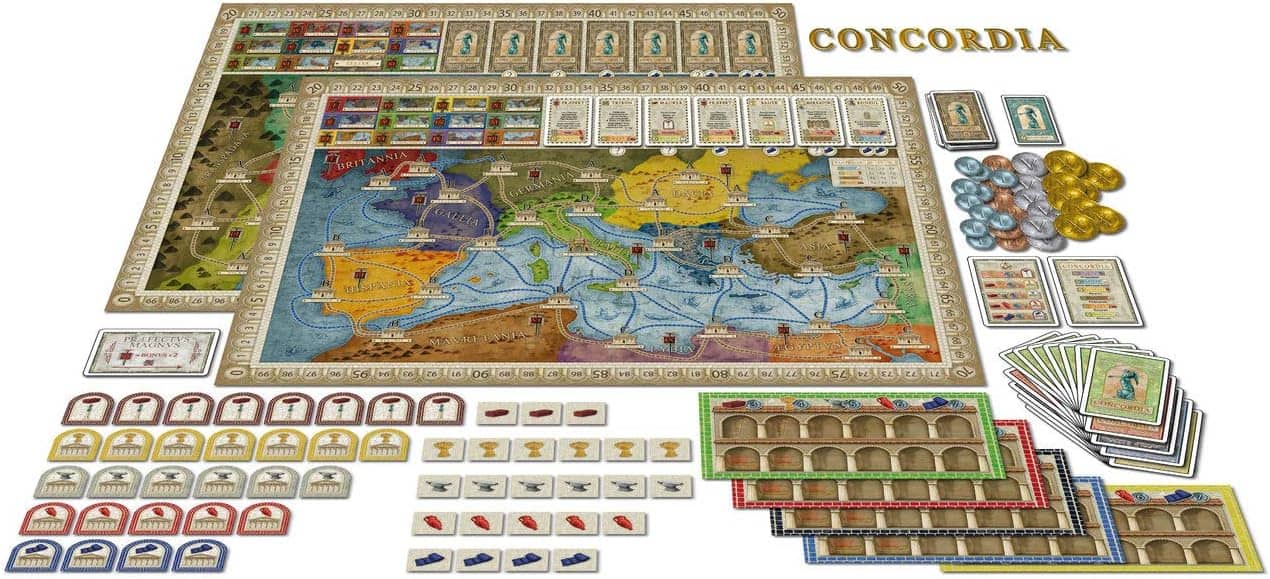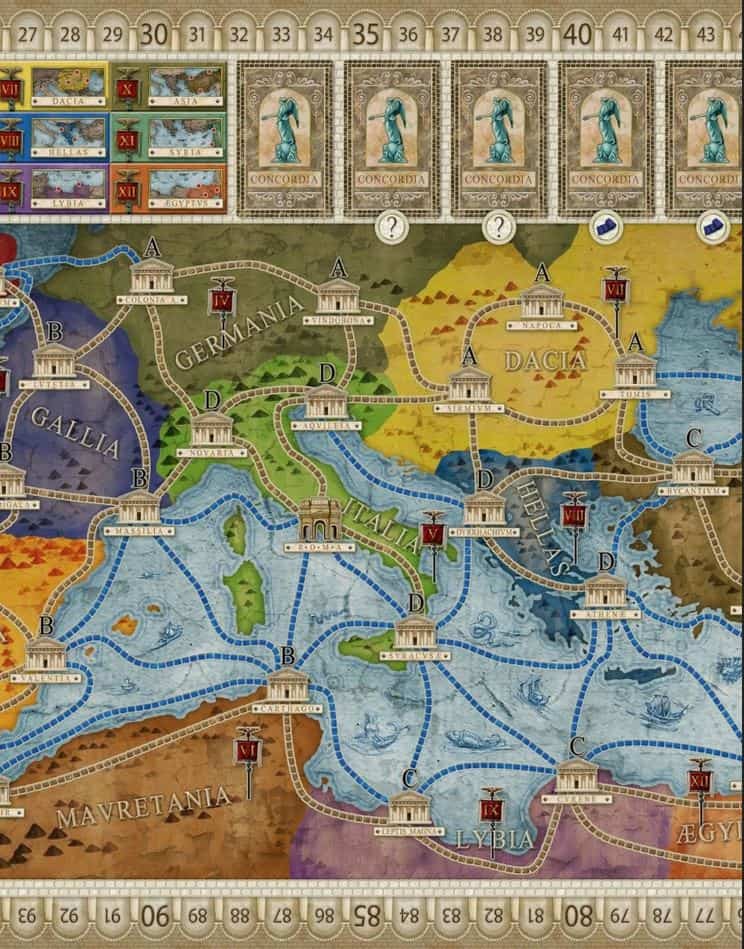Set in the time of the Roman Empire, Concordia challenges players to become astute governors of provinces, engaging in trade, expanding their influence, and optimizing their resources. The game’s genius lies in its streamlined mechanics and the delicate balance between tactical decision-making and long-term strategy. Every move has consequences, and players must carefully orchestrate their actions to outmaneuver their rivals and accumulate wealth and power.
At its heart, Concordia is a game of resource management and spatial strategy, where players seek to maximize their potential while navigating the ever-changing landscape of the Roman world. It’s a beautifully crafted journey through history, where the elegance of design and the depth of gameplay combine to create an experience that is both accessible to newcomers and endlessly engaging for seasoned board gamers.
What’s included in Concordia?

- Game Board: The board represents the map of the Roman Empire divided into provinces and regions.
- Player Cards: Each player receives a set of cards representing different roles and actions.
- Resource Tokens: Various types of resources, including brick, food, tools, and cloth.
- Colonist Tokens: Used to keep track of the number of colonists in your provinces.
- Houses: Tokens representing your presence in the provinces.
- Trading Posts: Tokens to indicate your trade routes.
- Money: Denotes your wealth in the game.
- Score Tokens: Used to track your score.
How to play Concordia
Setup
- Place the game board in the center of the table.
- Distribute starting resources, money, and colonists to each player according to the player count.
- Shuffle the role cards and deal one to each player. The role cards determine turn order.
- Place the colonists, houses, and trading posts in the corresponding supply areas.
- Set up the resource tokens in their designated areas on the board.
Rules for Concordia

Concordia is played in a series of rounds, each consisting of the following phases:
- Choose a Role: Players take turns playing one of their role cards from their hand. Each role card corresponds to a specific action, such as trading, moving, or producing resources. When a player plays a role card, they announce the name of the role and execute its associated action.
- Execute the Role: Once a role is played, all players, including the player who played the role, perform the action associated with that role. For example, if the Senator role is played, all players may trade resources with their neighbors.
- Recall Your Cards: After executing the role, the player who played the role card takes back all of their played role cards into their hand. Other players keep their role cards face-up in front of them.
- Score: Throughout the game, players can score points by founding cities and establishing trade routes. These points are tracked using score tokens on the scoring track.
- End of the Game: The game ends when all players have played all of their role cards. The player with the most points wins.
Key Concepts
- Resources: Players collect and use resources to trade, build houses, and establish trade routes.
- Cities: Founding cities on the board provides points and expands your influence.
- Trade Routes: Establishing trade routes between cities also scores points.
- Trading: Players can trade resources with their neighbors during the trading phase.
- Colonists: Colonists are used to occupy provinces and establish presence on the board.
Winning the Game: The player with the most points at the end of the game is declared the winner. Points are earned through various actions, such as founding cities, establishing trade routes, and other scoring opportunities throughout the game.
For the official rules, see the link below:
How to win Concordia
- Resource Efficiency: Efficiently managing your resources is crucial. Consider what resources you’ll need in the short and long term. Avoid stockpiling too many resources that you won’t use soon, as they don’t earn you points. Similarly, don’t run out of essential resources when you need them.
- Diversify Your Actions: While specializing in one action type (e.g., building cities) can be a valid strategy, it’s often beneficial to diversify your actions. A balanced approach allows you to adapt to changing circumstances and maximize your points. For example, founding cities and establishing trade routes both contribute to your score.
- Establish Trade Routes: Trade routes are a consistent source of points throughout the game. Try to connect your cities and expand your network strategically. Prioritize regions that offer scoring bonuses for trade routes.
- Found Cities Wisely: Founding cities is essential for scoring points, but the timing and location are critical. Look for regions with high-value cities, but also consider adjacency bonuses and trade route potential. Avoid rushing to found cities without considering their long-term benefits.
- Use Your Role Cards Wisely: Your choice of role cards determines your actions and order in each round. Consider your overall strategy, board position, and the roles your opponents are likely to play. Sometimes it’s beneficial to play a role card to block or delay your opponents from accessing important actions.
- Focus on Colonists: Colonists are essential for expanding your presence on the board. They allow you to found cities and establish trade routes. Ensure you have enough colonists to execute your plans effectively.
- City Bonuses: Some cities provide bonuses when founded, such as additional resources or colonists. Keep an eye on these cities, as they can give you an advantage.
- Pay Attention to Scoring Opportunities: Points are earned through various actions, including controlling regions, founding cities, and trade routes. Pay attention to scoring opportunities as the game progresses and adjust your strategy accordingly.
- Long-Term Planning: While it’s crucial to adapt to the current state of the game, don’t lose sight of your long-term goals. Consider how each action contributes to your overall strategy and point accumulation.
- Competitive Awareness: Be aware of your opponents’ strategies and try to anticipate their moves. Blocking an opponent from a key action can be as important as executing your own plans.